
How to Hire Offshore Developers in 2024: Tips & Trends
Want to develop custom software without breaking the bank in 2024?
Hiring offshore developers could be the right option for you.
In this article, we take a deep dive into the smartest strategies and trends for tapping into global tech talent. From understanding the cost-saving benefits to navigating the dynamic landscape of technology and market shifts, get ready to unlock the full potential of offshore development for your business.
Contents
- What is offshore development?
- What is an offshore software development company
- Benefits of hiring offshore developers
- Cost of offshore developers
- How to hire offshore developers: step by step guide
- Top destinations to hire offshore developers
- Best practices to hire offshore developers
- Hiring offshore developers in 2024: most important trends
- Stratoflow – offshore development company
What is offshore development?
Offshore software development refers to the practice of outsourcing software development tasks to a third-party company or team located in a foreign country.
This approach is often adopted by companies seeking cost-effective solutions for software development, as labor and operational costs can be significantly lower in some offshore locations. The offshore development team is responsible for designing, developing, and maintaining software applications as per the client’s requirements.
Working with offshore software developers allows companies to leverage global talent, access specialized skills, and work around the clock due to different time zones. However, it also requires effective communication strategies and project management to overcome challenges such as cultural differences, language barriers, and coordination across time zones.
Offshore software development is a strategic decision that can lead to cost savings, increased efficiency, and competitive advantage in the global market.
What is an offshore software development company
An offshore software development company is a business entity that specializes in providing software development services to clients located in different countries.
This type of company operates from a country with lower labor and operating costs, providing a cost-effective alternative for companies seeking to develop software applications. Offshore companies typically offer a range of services, including but not limited to custom software development, application maintenance, systems integration, web development, technical due diligence, and research & development.
These companies employ skilled offshore developers and IT professionals who are proficient in various programming languages and development frameworks. They work on projects commissioned by foreign clients, adhering to the specified requirements, quality standards and deadlines. The offshore model allows these companies to tap into the global talent pool that offers expertise in various technology areas.
Working with offshore development companies often involves managing different time zones, cultural differences, and communication challenges. Despite these challenges, many companies choose offshore development to benefit from cost savings, scalability, and access to specialized skills that may not be readily available in their home country. These companies play a critical role in the global software development ecosystem, providing customized solutions to clients worldwide and contributing to the digitalization and technological advancement of various industries.
[Read also: Your Essential Guide to Nearshore Software Development]
Benefits of hiring offshore developers
Hiring offshore developers can bring several benefits to organizations of different sizes, including large enterprises, mid-sized companies, and startups.
For all types of organizations, successful offshoring requires effective communication, clear project management, and an understanding of cultural differences. When managed properly, the benefits of hiring offshore developers can be substantial, helping organizations grow, innovate, and maintain a competitive edge in their respective markets.
The benefits can vary depending on the size, resources and business goals of the organization. Here’s a breakdown of the benefits for each type of organization:
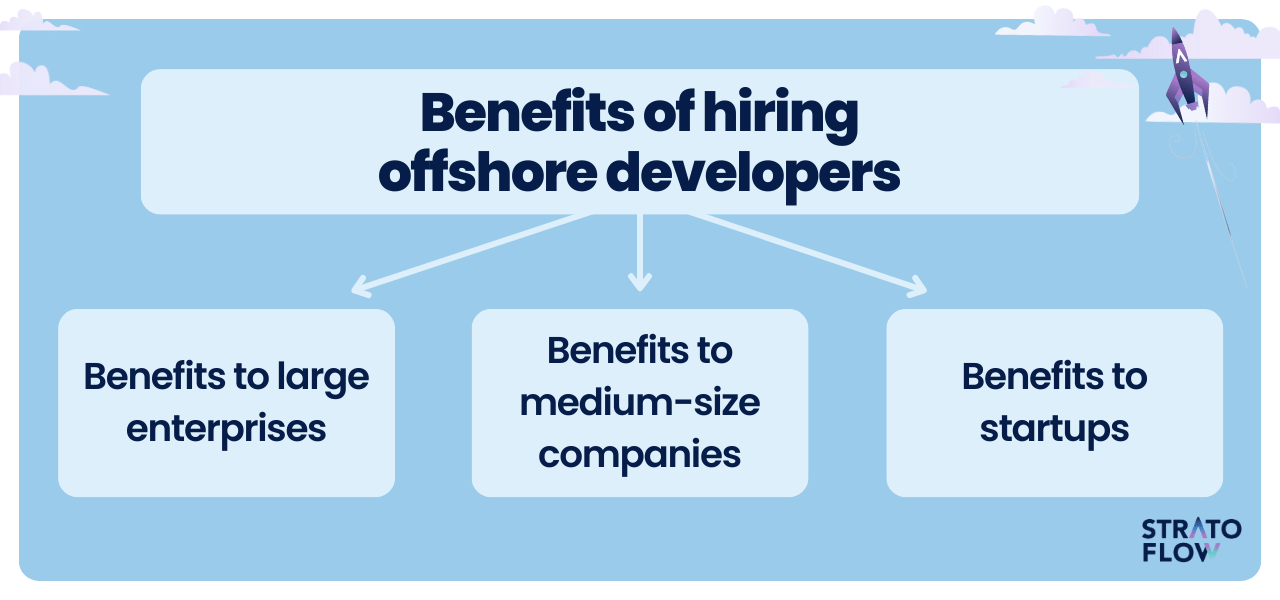
Large Enterprises
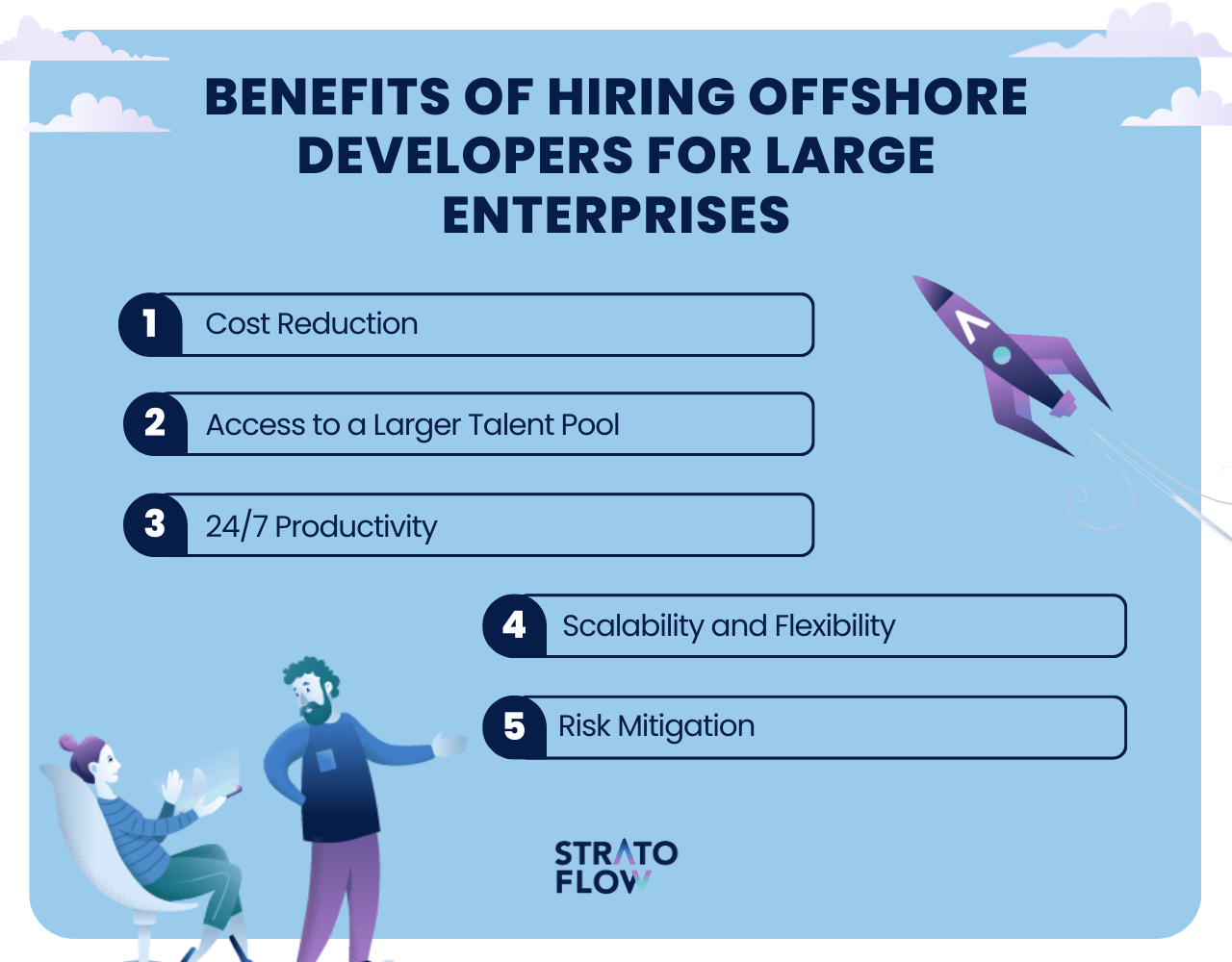
Cost Reduction
Large enterprises can take advantage of the significant financial benefits of offshore hiring.
By employing developers in countries with a lower cost of living, these companies can enjoy reduced labor costs without compromising the quality of the work. This approach not only reduces direct wage costs, but also reduces overhead costs associated with physical infrastructure and operational maintenance.
As a result, these savings can be strategically reinvested to support core business operations or fuel innovation and research initiatives, ultimately improving the company’s profitability and competitive position in the marketplace.
Access to a Larger Talent Pool
Offshoring allows large organizations to access a vast pool of skilled developers worldwide, overcoming local talent shortages.
This global network provides access to a wide range of experts, such as Angular developers or experienced full-stack developers, giving companies access to expertise critical to technological innovation and complex project delivery. By casting a wider recruiting net, these organizations ensure a constant influx of fresh, innovative ideas and cutting-edge skills, strengthening their market position and advancing their strategic goals.
24/7 Productivity
By having teams in different time zones, large organizations can ensure that someone is always working on their projects. When one part of the world goes to sleep, another wakes up, ensuring that the development process is continuous and uninterrupted.
This continuous cycle not only accelerates project timelines, but also ensures that customer support and back-end operations are always active, providing a significant competitive advantage in terms of responsiveness and project turnaround times.
Scalability and Flexibility
Hiring talented offshore developers gives large organizations unparalleled flexibility in managing their workforce.
They can dynamically adjust their team size in response to project demands, ensuring that resource allocation is both efficient and cost-effective. This agility allows them to quickly adapt to market changes, unexpected project developments or evolving business strategies, all while maintaining operational continuity and avoiding the pitfalls and commitments associated with permanent staff.
Risk Mitigation
By spreading their operations across multiple countries, large companies effectively spread and mitigate regional risks.
This geographic diversification provided by offshore developers acts as a hedge against localized economic downturns, political unrest, or natural disasters.
[Read also: Introduction to IT staff augmentation]
Mid-Size Companies
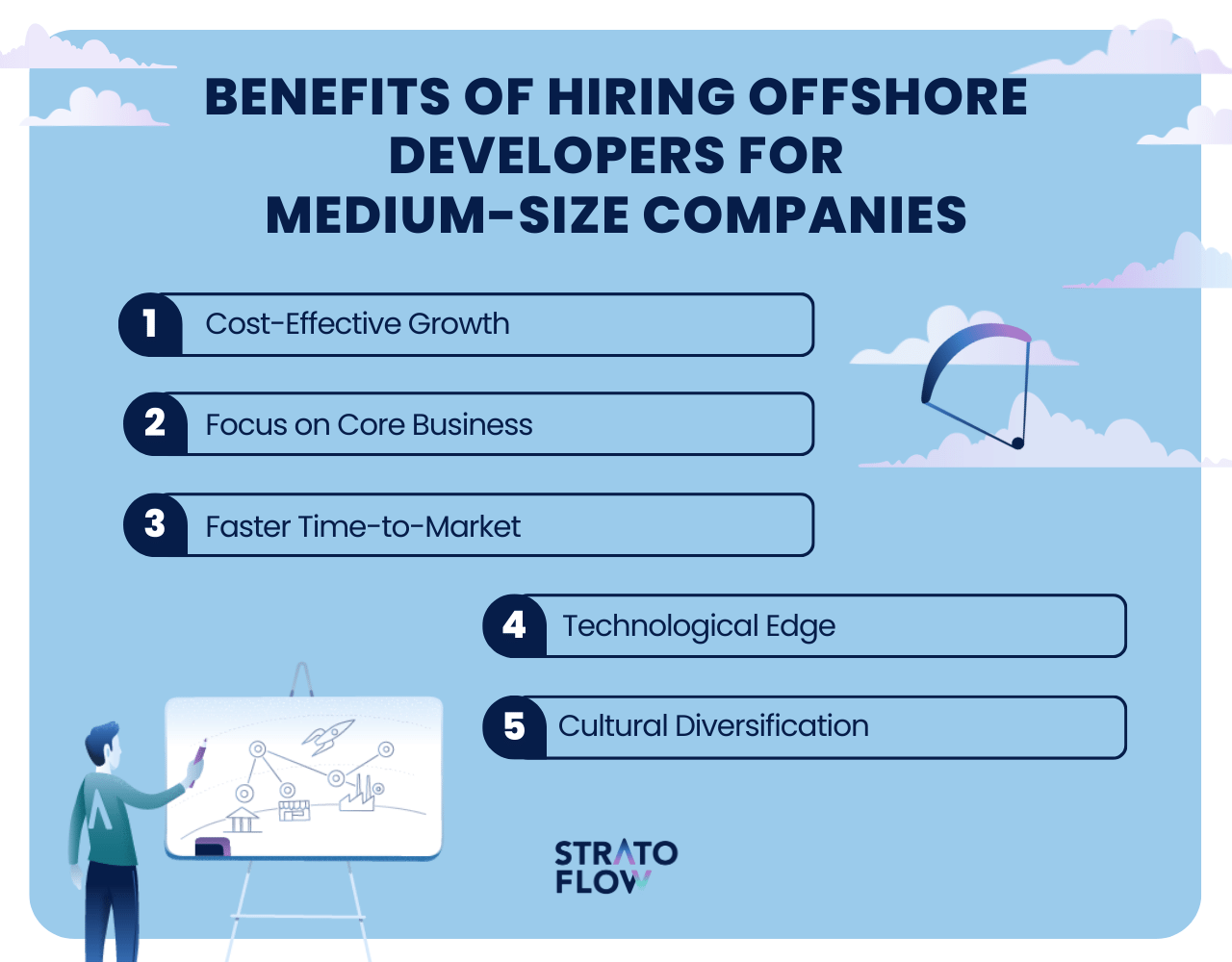
Cost-Effective Growth
Mid-sized companies often balance growth aspirations with budget constraints, making cost-effective solutions such as offshore development particularly attractive.
By hiring developers in regions with lower labor costs, these companies can expand their technical capabilities without incurring the significant financial burden typical of local hiring. This approach allows them to allocate resources more efficiently and invest saved funds in core business areas such as product development or market expansion, fueling sustainable growth without compromising financial stability.
Focus on Core Business
By hiring an offshore development team, mid-sized companies can streamline their operational focus and redirect internal resources and energies to strategic business activities.
By delegating technical work to offshore teams, these companies can focus on strengthening their market position, improving customer relationships, and refining their product or service offerings.
Faster Time-to-Market
In today’s fast-paced business environment, speed is often synonymous with success.
Mid-sized companies, with their leaner structures, can benefit significantly from the agility offered by offshore development teams. These teams can accelerate the development cycle, enabling the company to bring products or services to market faster.
This speed to market is critical to capitalizing on market opportunities, staying ahead of competitors, and meeting consumer demands in a timely manner, which ultimately impacts the company’s bottom line.
Technological Edge
Offshore developers often bring specialized skills and fresh perspectives that can be invaluable to mid-market companies looking to innovate and differentiate their offerings. Access to a global talent pool ensures that these companies can incorporate the latest technologies and industry best practices into their operations.
This infusion of cutting-edge technology and expertise can significantly improve product quality, operational efficiency, and customer satisfaction, setting the company apart in a crowded marketplace.
Cultural Diversification
Working with a globally distributed team enriches a company’s culture with diverse perspectives and ideas. This cultural diversification can stimulate creativity and drive innovation within the organization, encouraging the exploration of new solutions and approaches.
Startups
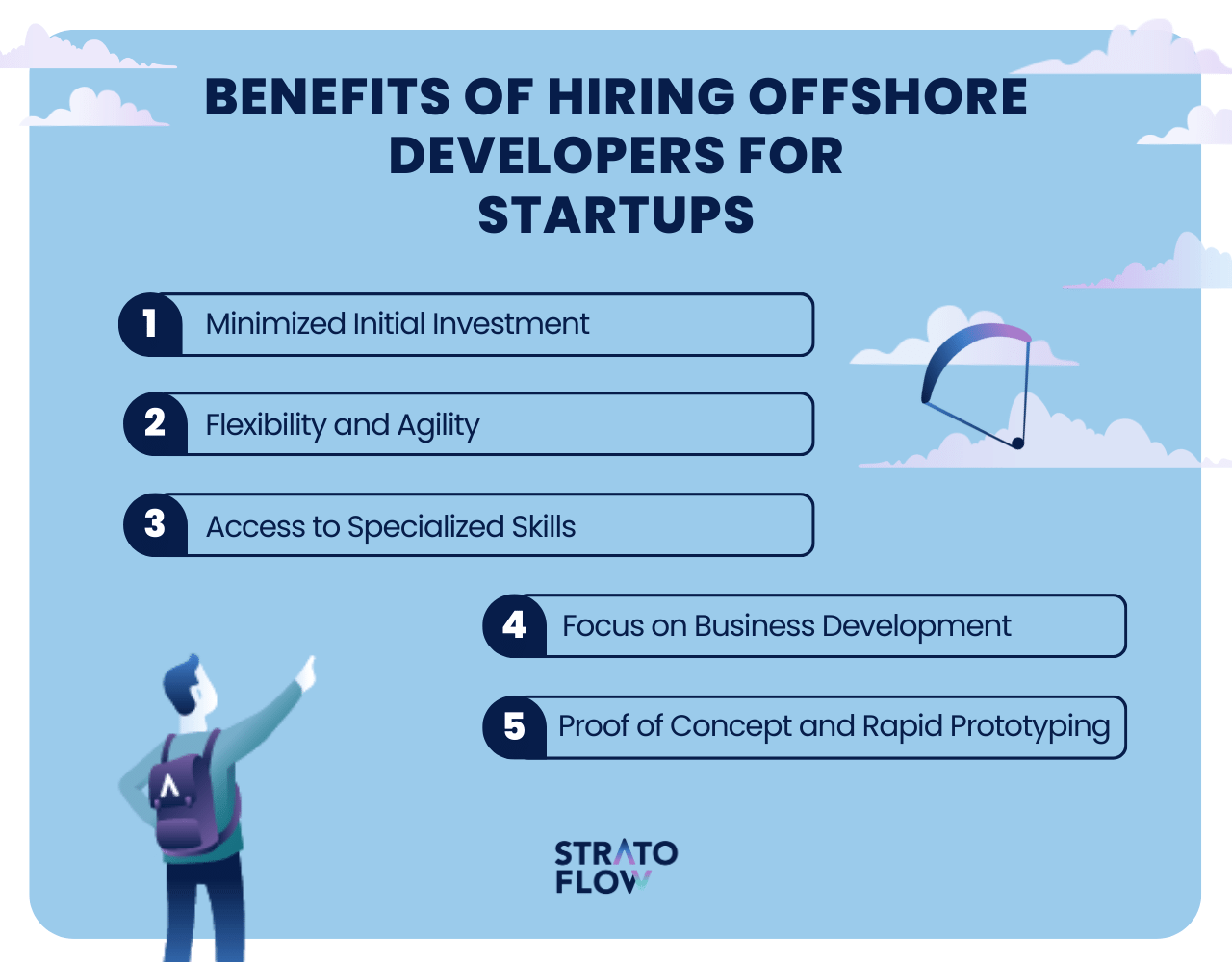
Minimized Initial Investment
Startups typically operate under tight financial constraints, making the lean allocation of resources a priority.
Offshore development offers a cost-effective solution by significantly reducing the costs associated with hiring, infrastructure, and ongoing maintenance. By leveraging the lower cost structures of certain regions, startups can develop their products or services without the heavy financial burden of local salaries and operational costs, ensuring that valuable capital can be conserved or invested in other critical areas of the business.
Flexibility and Agility
The fast-paced and often unpredictable nature of startup growth requires a high degree of flexibility and agility, especially when it comes to scaling operations.
Offshore developers provide startups with the ability to quickly adjust their team size and composition in response to changing project requirements, market conditions, or funding realities. This scalability ensures that startups can remain agile and responsive, scaling up quickly during periods of growth or scaling down to effectively manage costs during slower periods.
Access to Specialized Skills
Startups, especially those in niche or technical sectors, often require specific skills that may not be readily available or affordable in their local market.
Offshore development opens up a global talent pool, allowing startups to tap into a wide range of specialized skills and expertise. This access not only drives innovation and quality in product development, but also provides startups with the technical capabilities needed to solve complex problems, develop cutting-edge solutions, and maintain a competitive edge.
Focus on Business Development
By outsourcing technical development to offshore teams, startup founders and core in-house teams can focus on critical business development activities such as strategy formulation, market research, customer acquisition, and investor relations. This reallocation of focus ensures that the most critical and impactful areas of the startup receive the attention and resources they need to thrive, drive business growth, and secure the startup’s position in the market.
On the other hand, insourcing, or relying on internal teams for technical development, can be beneficial. It ensures direct control over projects, facilitates immediate communication, and nurtures a cohesive company culture. However, it requires substantial investment in recruitment, training, and infrastructure. Startups can optimize their operations and strategic focus by balancing insourcing and outsourcing to achieve a blend of direct control and specialized expertise.
Proof of Concept and Rapid Prototyping
The ability to quickly develop and iterate on prototypes or proof-of-concept and minimum-value product models is critical for startups, especially in the early stages of product development or when seeking investment.
Offshore developers can accelerate this process, enabling startups to quickly turn ideas into tangible products. This speed in prototyping and iteration not only facilitates a more efficient product development cycle, but also enhances a startup’s ability to attract investors and enter the market with a well-tested, market-ready offering.
[Read also: How to Prepare for a Successful System Migration Project]
Cost of offshore developers
The cost of hiring offshore developers is often significantly lower than hiring local talent, which is one of the key benefits of this model.
As we’ve mentioned before, this cost-effectiveness is primarily due to the lower cost of living and wage expectations in many offshore locations, allowing companies to hire skilled developers at a fraction of the cost they would incur domestically.
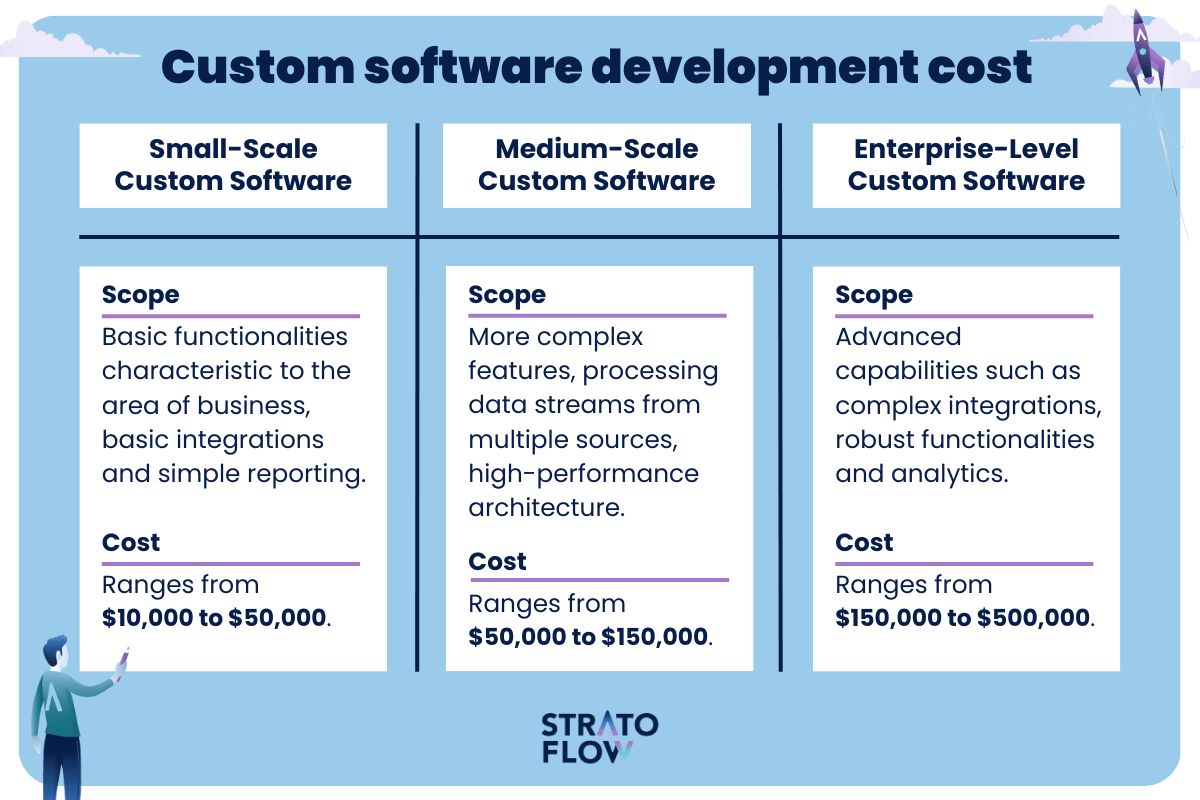
For example, while a developer in a Western country may command a six-figure salary, his or her counterpart in Eastern Europe or Asia may provide comparable skills and services at a significantly reduced rate, sometimes less than half the domestic cost.
Comparing developer salaries, the average salary in the US is around $107,500, with a range typically between $95,000 and $120,000. In the UK, the average salary is around £64,000.
By comparison, the average salary for a software developer in Poland is approximately PLN 12,600 per month, which equates to approximately PLN 151,200 per year, or approximately $37,000. This stark contrast underlines the cost advantage of offshoring to countries like Poland, where companies can access skilled developers at a fraction of the cost compared to the US or UK.
[Read also: How to Estimate the Cost of Software Development [Experts Insights]]
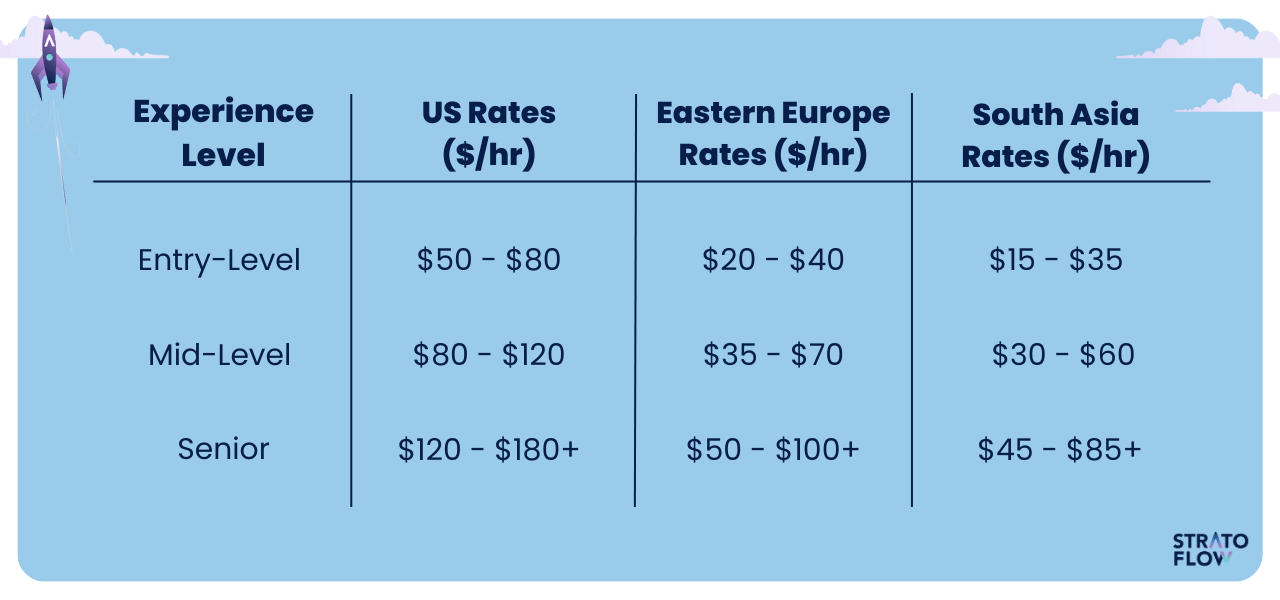
This substantial difference in labor costs, combined with savings on operational overheads such as office space and equipment, can result in significant financial savings. As a result, companies that choose offshore development can potentially save a significant percentage of their development budget, allowing them to allocate resources more efficiently or invest in other strategic areas of their business.
[Read also: How to Find App Developers Near Me in 2024? Comprehensive Guide]
How to hire offshore developers: step by step guide
Embarking on the journey of hiring offshore developers is more than just picking a name from a list; it’s about forming a strategic partnership that aligns with your business goals.
In this section, we outline a six-step guide to help you carefully select and work with the right offshore software development partner to ensure a fruitful and efficient alliance.

Step 1: Identify Your Requirements

Before you contact a software development company, it’s important to have a clear understanding of your project needs.
Define the scope, goals, and specific requirements of your software project. This includes the tech stack, the size of the project, and any special expertise you need. A well-defined project scope will ensure that you effectively communicate your needs to the offshore company and the offshore team, laying a solid foundation for your collaboration.
Step 2: Research and Select a Reputable Company

If you want to hire offshore developers, invest time in researching potential software development companies.
Look for companies with a strong track record, positive client testimonials, a portfolio that matches your project requirements, and a high level of technical expertise. Consider factors such as the company’s experience in your industry, technological expertise, and approach to project management. Choosing a reputable company will not only ensure quality results, but also a smoother, more reliable collaboration throughout your project.
Step 3: Evaluate Communication and Workflow Compatibility

Effective communication is key to the success of any offshore project. Evaluate the company’s communication tools, language skills, and willingness to coordinate with your time zone for meetings and updates. In addition, understand their workflow and project management methods to ensure they meet your expectations. A company that is flexible and adept at communication can significantly reduce misunderstandings and streamline the development process.
Step 4: Discuss and Plan the Project

Once you’ve selected a company, you’ll begin detailed discussions about your project. This includes finalizing the project scope, timelines, milestones, and deliverables. Make sure you have a clear and comprehensive contract that outlines the terms of the project, including confidentiality clauses, payment terms, and any post-development support or maintenance agreements. A well-planned project with mutually agreed upon terms lays a strong foundation for successful collaboration.
Step 5: Set Up a System for Regular Updates and Feedback

Establish a system for regular updates, feedback, and iterations.
Decide on the frequency of meetings with the offshore development team, the format of progress reports, and the channels of communication. A transparent and consistent feedback loop helps you address issues quickly, make necessary adjustments, and keep the project on track. Regular interaction with the offshore development team keeps you involved in the development process and ensures that the final product is in line with your vision.
Step 6: Conduct Thorough Testing and Deployment

Ensure thorough testing prior to final deployment of the software to identify and resolve any bugs or issues.
Work closely with the offshore development team during the testing phase to understand the functionality and performance of the software. Once the software meets your standards and requirements, proceed with deployment. Ensure that you have support from the offshore development team for any initial post-deployment hiccups or required maintenance.
Top destinations to hire offshore developers
When searching for top destinations to hire an offshore development team, it’s essential to weigh factors such as workforce skills, economic stability, language compatibility, and time zone convenience.
In this context, Poland emerges as a highly compelling option. Known for its pool of highly skilled and experienced software developers, Poland offers competitive rates that provide a significant cost advantage.
The English proficiency of Polish software developers ensures smooth and effective communication, a critical component for successful collaboration in software development projects. In addition, the Polish economy is robust and steadily growing, reflecting a stable and reliable business environment.

In addition, Poland’s time zone is conducive to real-time collaboration with most European countries and even U.S.-based clients, ensuring that communication and workflow synchronization are seamless and efficient.
Together, these attributes position Poland not only as a destination for cost savings, but also as a hub for quality, reliability, and convenience in the realm of offshore software development. If you want to know more about Poland, as a destination for software development outsourcing we highly encourage you to check out our complete guide on that topics: Software Development in Poland: a Guide to IT Outsourcing, in which we go in-depth into the details of the booming Polish software development industry.
Best practices to hire offshore developers
Hiring offshore developers requires a blend of strategic planning, clear communication, and meticulous management. To embark on this journey successfully, consider the following best practices:
- Vet Potential Partners Thoroughly – Don’t rush. Take your time to scrutinize the portfolio, expertise, and client feedback of potential offshore companies. A proven track record in projects similar to yours is a green light.
- Communicate Clearly and Often – Set the tone for open, frequent communication with the app development team. Regular video calls, clear emails, and detailed documentation are your best tools to ensure everyone is on the same page.
- Cultural Compatibility Matters – Acknowledge the cultural nuances as they are more important than most people might initially assume. Understanding your offshore team’s work culture fosters mutual respect and smoother collaboration.
- Legal and IP Protection – Don’t skimp on legalities. Ensure your contract covers all bases, especially intellectual property rights and confidentiality. It’s not just paperwork; it’s your peace of mind.
- Regular Updates Are Key – Whether it’s a weekly status meeting or a bi-weekly report, a consistent check-in routine keeps surprises at bay and projects on track.
- Post-Deployment Support – In all enterprise software projects you have to think long-term. Ensure your offshore partner is on board for maintenance and support post-launch. The end of development is just the beginning of your product’s lifecycle.
By navigating these nuances with care and consideration, you can transform the offshore development journey into a powerful lever for growth, innovation, and competitive advantage.
Hiring offshore developers in 2024: most important trends
In 2024, hiring offshore developers is not just a trend, but a strategic imperative marked by profound changes in technology, demographics, and the global business landscape.
For starters, software development offshoring in 2024 will be significantly influenced by cutting-edge technologies such as AI, cloud-native development, and IoT, particularly in sectors such as healthcare. Organizations are increasingly adopting these technologies to drive innovation, with AI-powered development being a critical factor in streamlining operations and increasing productivity.
The demographic landscape of offshore staffing is shifting towards a younger, more diverse workforce. There’s a growing presence of millennials and Gen Z in the talent pool, bringing with them digital fluency and a preference for flexible work arrangements.
As digital transformation accelerates, so does the importance of cybersecurity and data privacy.
Offshore providers are investing heavily in cybersecurity infrastructure and adhering to strict data privacy laws. To ensure the security of sensitive data and intellectual property, companies must comprehensively assess their offshore partners’ cyber maturity and regulatory compliance.
Last but not least, the remote working revolution continues to break down geographical barriers, allowing companies to tap into a global talent pool.
The rise of remote work arrangements and the advent of AI-powered hiring are transforming the recruitment landscape, allowing companies to source, acquire and manage talent more efficiently and creatively.
[Read also: Software Development Process: Comprehensive Guide]
Stratoflow – offshore development company
If you are looking to hire the best offshore developers, look no further!
At Stratoflow, our expertise in developing high-performance custom software is unparalleled, especially for industries that demand precision and reliability, such as fintech, healthcare, e-commerce, and travel.
With over a decade of commercial experience, our team of experts has consistently delivered solutions that are not only robust and efficient, but also meticulously tailored to meet the unique needs of each client.
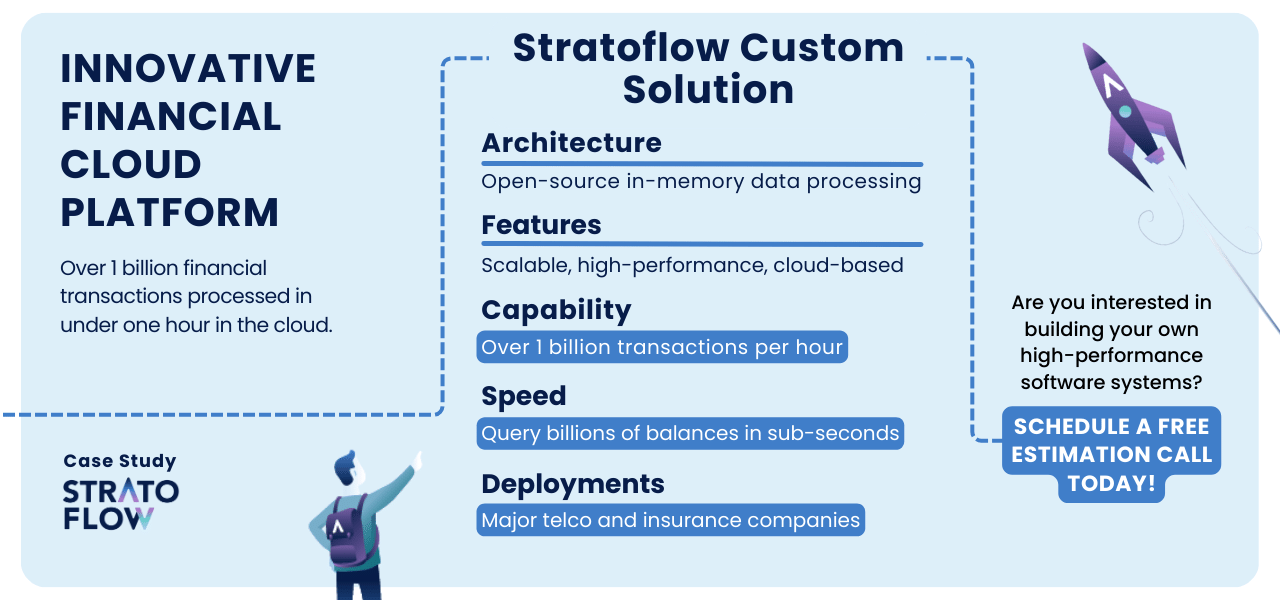
In software development, there’s no such thing as one size fits all and we understand that.
That’s why we always adopt an agile and customer-centric approach, ensuring that every project we undertake is executed with the utmost attention to detail and alignment with our client’s objectives. We value the trust our clients place in us, and we strive to turn that trust into tangible success by fostering long-term partnerships built on the foundation of reliable and high-performing software solutions.
If you are considering hiring offshore developers, contact us to explore how our dedicated developers can bring your vision to life! Together, let’s navigate the path to digital excellence and turn your innovative ideas into reality!
Related Posts
Thank you for taking the time to read our blog post!

